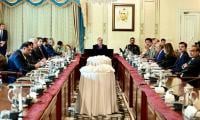KARACHI: After the miserable failure of the Sindh Solid Waste Management Board (SSWMB) to effectively clean Karachi’s districts, resulting in massive floods during the recent spells of rain, the provincial government has launched another project to manage the city’s solid waste.
With the assistance of the World Bank, the Sindh government is working on the Solid Waste Emergency & Efficiency Project (SWEEP), which isn’t only about managing solid waste but also involves the cleaning of storm water drains.
According to the project’s brief, 4,000 to 5,000 tonnes (40 per cent) of the solid waste generated in Karachi every day is disposed of in storm water drains, immediately choking these sewage carriers.
Moreover, recyclers and waste pickers have encroached on lands near these drains, and they dump the leftover solid waste in them. This is something that the SSWMB has either failed to address or it is beyond the scope of the board, which isn’t really responsible for cleaning storm water drains. The brief also shows that the provincial government annually invested Rs400 million to Rs500 million on the cleaning of drains in the past three years, but proper documentation and recording at disposal sites was not carried out. SWEEP, however, will document the disposal. Last August the Sindh government sought the WB’s assistance for improving the city’s infrastructure and the capacity-building of all the elected local councils under the Competitive & Livable City of Karachi Project for Pakistan (CLICK), which is worth $240 million (Rs40.5 billion).
The project has three key components: capacity improvement for infrastructure and improvement of Karachi’s local councils under the local government department for $181.86 million (Rs30.7 billion), improvement of the urban property tax system through the excise & taxation department for $40.4 million (Rs6.8 billion) and setting up the Sindh Investment Portal through the investment department for $17.2 million (Rs2.9 billion). The Sindh government had formally launched the project this January 24. Its office was established at the office of the South District Municipal Corporation (DMC) in Aram Bagh.
The WB has allocated $10 million (Rs1.7 billion) for solid waste management improvement for CLICK’s first component, Project Director Zubair Channa told The News. But, he said, that was a soft component, such as capacity building and project development, and didn’t involve infrastructure development. During all these developments in November last year, the WB agreed to finance the implementation of the solid waste management component, giving birth to another CLICK component, namely SWEEP, with a cost of $100 million (Rs16.9 billion). On June 8 the federal government’s planning & development department had approved SWEEP’s concept note.
One of the main SWEEP components was emergency cleaning of storm water drains, which was also directly linked with solid waste being thrown in drains. On June 8 the Sindh government had asked the WB to use the allocated funds for emergency cleaning because the preparation and approval of the project’s PC-I would take time. Channa said the WB approved the request and asked the provincial government to arrange funds for the cleaning of storm water drains from their own resources, which would be returned later to the government.
Since SWEEP didn’t exist back then, a summary was moved and CLICK’s project director was authorised to undertake the responsibility of SWEEP for the emergency component on June 23. The Karachi Metropolitan Corporation (KMC) was tasked with executing the cleaning work because storm water drains fall under its jurisdiction, while SWEEP monitored the work. Channa said the National Engineering Services Pakistan (Nespak) was hired for third-party verification of the cleaning process after the chief minister’s approval, adding that Nespak’s work was quantification of the filth taken out from the drains.
As for the dumping of waste, two landfill sites — 10 acres of Jam Chakro and five acres of TP-1 — have been identified. Pre- and post-cleaning drone situational surveys of all 38 drains of the city are being carried out to ensure post-cleaning effects. Nespak is engaged in spot checking and monitoring of the cleaning, while the KMC staff deployed at each drain issues QR-coded slips to the contractor to control pilferage and leakage. Payment to the contractors depends on the amount of sludge taken out and disposed of at the dumping sites. The project’s brief states that 19 major storm water drains are being cleaned right now, including the Orangi, Gujjar, Mehmoodabad, Sungal, Soldier Bazaar, Kalri, Pitcher and Mehran Cut drains, and no sludge is being dumped along their sides. After the recent floods in the city’s Central and West districts, the federal government tasked the National Disaster Management Authority with cleaning storm water drains, following which Gujjar Nullah is being cleaned by the Frontier Works Organisation. Around 4.4 million cubic feet of sludge had been shifted from the drains to the landfill sites until August 6. Besides drains’ cleaning, SWEEP includes the construction of a temporary sludge storage cell at the Jam Chakro landfill site for $2 million (Rs337.8 million), a campaign for communication and outreach activities for behavioural change for $1 million (Rs168.9 million), and the construction and improvement of an engineered sanitary site at the Jam Chakro dumpsite for $20 million (Rs3.4 billion).
The project also includes the construction of modern scientific garbage transfer stations (GTS) with the material recovery facility for $20 million, retro-fitting of the existing garbage points and the construction of new ones for $2 million, the construction and development of an engineered sanitary landfill site at Dhabeji and allied infrastructure for $25 million (Rs4.2 billion), and the provision of equipment and machinery to local councils and the SSWMB for $5 million (Rs844.4 million).
The overhauling and refurbishing of solid waste-related machinery of the KMC, the DMCs, the Karachi District Council and the SSWMB for $3 million (Rs506.7 million), the construction, installation and commissioning of medical and industrial hazardous waste treatment facilities for $9 million (Rs1.5 billion), and project management and implementation support for $5 million are also part of SWEEP.
Most of these projects have also been a regular feature of the Sindh government’s annual development budget since the SSWMB’s launch.
The board’s Landfill Sites Director Majid Ghori told The News that four to five projects have been proposed for establishing modern GTS, for which studies are being conducted.
Perusal of the budget documents shows that the setting up of six GTS with the material recovery and refuse-derived fuel facility in Karachi, the development of the two existing engineered sanitary landfill sites and their scientific improvement, and a feasibility study-integrated medical hazardous waste management project in Karachi are some of the projects that have been a regular feature of the board’s annual budget since its launch.
Moreover, Ghori confirmed that the Chinese companies tasked with lifting garbage in four districts of the city are also responsible for a campaign for public awareness, communication and outreach activities for behavioural change for garbage disposal. However, the board and their Chinese contractors have failed to do so.
In a council resolution Karachi Mayor Wasim Akhtar recently approved a contract with the WB for CLICK, one of whose components is SWEEP. But he is unaware of the overlapping functions and projects of the SSWMB and SWEEP. He told The News that the board is a total failure.
As for GTS, Local Government Secretary Roshan Ali Sheikh told The News that 12 of these are to be constructed in the city: four under SWEEP and eight by the Sindh government. When asked about other projects and the public awareness component, he said SWEEP will be active for a brief period and also strengthen the SSWMB.
Notification says Gujrat district now comprises five tehsils: Gujrat, Kharian, Sarai Alamgir, Jalalpur Jattan, and...
Latif Khosa tells court that he had to go to London till January 5 but travel restrictions had been imposed on him
LHC says presenting accused persons via video link for physical remand cases may affect their fundamental rights
Rauf says sanctions were based on hearsay and lack of substantial evidence
Govt wheat will be supplied to the people at a subsidized rate of Rs 2,800 per 40 kilograms,” says notification
Letter requests to avoid considering Hamayun for position of additional judge







